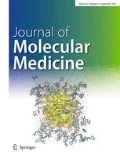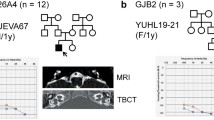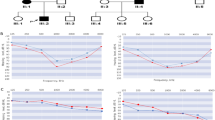Abstract
Although hereditary hearing loss is highly heterogeneous, only a few loci have been implicated with low-frequency hearing loss. Mutations in one single gene, Wolfram syndrome 1 (WFS1), have been reported to account for most familial cases with this type of hearing impairment. This study was conducted to determine the cause of nonsyndromic low-frequency hereditary hearing impairment in two large families. Two large families from Switzerland and United States with low-frequency hearing loss were identified. Genomewide linkage analysis was performed followed by mutation screening in the candidate gene WFS1 with direct DNA sequencing and restriction fragment analysis. Both families were linked to DFNA6/14/38 with lod scores>3. Two novel heterozygous missense mutations in WFS1 were identified: c.2311G>C leading to p.D771H in the Swiss family and c.2576G>C leading to p.R859P in the US family. The sequence alteration was absent in 100 control chromosomes. Nonsyndromic low-frequency hereditary hearing impairment seems to be predominantly a monogenic disorder due to WFS1. We confirm that most mutations in WFS1 associated with isolated low-frequency hearing loss are clustered in the C-terminal protein domain coded by exon 8.







Similar content being viewed by others
References
Van Camp G, Smith R Hereditary hearing loss homepage. http://dnalab-www.uia.ac.be/dnalab/hhh/
Lesperance MM, Hall JW III, Bess FH et al (1995) A gene for autosomal dominant nonsyndromic hereditary hearing impairment maps to 4p16.3. Hum Mol Genet 4:1967–1972
Van Camp G, Kunst H, Flothmann K et al (1999) A gene for autosomal dominant hearing impairment (DFNA14) maps to a region on chromosome 4p16.3 that does not overlap the DFNA6 locus. J Med Genet 36:532–536
Lynch ED, Lee MK, Morrow JE, Welcsh PL, Leon PE, King MC (1997) Nonsyndromic deafness DFNA1 associated with mutation of a human homolog of the Drosophila gene diaphanous. Science 278:1315–1318
Young TL, Ives E, Lynch E et al (2001) Non-syndromic progressive hearing loss DFNA38 is caused by heterozygous missense mutation in the Wolfram syndrome gene WFS1. Hum Mol Genet 10:2509–2514
Gürtler Nea, Kim Y, Mhatre A, Schlegel C, Mathis A, Lalwani AK (2004) DFNA54, a third locus for low-frequency hearing loss. J Mol Med 82:775–780
Bespalova IN, Van Camp G, Bom SJH et al (2001) Mutations in the Wolfram syndrome 1 gene (WFS1) are a common cause of low frequency sensorineural hearing loss. Hum Mol Genet 10:2501–2508
Inoue H, Tanizawa Y, Wasson J et al (1998) A gene encoding a transmembrane protein is mutated in patients with diabetes mellitus and optic atrophy (Wolfram syndrome). Nat Genet 20:143–148
Osman AA, Saito M, Makepeace C, Permutt MA, Schlesinger P, Mueckler M (2003) Wolframin expression induces novel ion channel activity in endoplasmic reticulum membranes and increases intracellular calcium. J Biol Chem 278:52755–52762
Takeda K, Inoue H, Tanizawa Y et al (2001) WFS1 (Wolfram syndrome 1) gene product: predominant subcellular localization to endoplasmic reticulum in cultured cells and neuronal expression in rat brain. Hum Mol Genet 10:477–484
Hofmann S, Philbrook C, Gerbitz KD, Bauer MF (2003) Wolfram syndrome: structural and functional analyses of mutant and wild-type wolframin, the WFS1 gene product. Hum Mol Genet 12:2003–2012
Ott J. Genetic linkage programs. ftp://linkage.rockefeller.edu/software
Strom TM, Hortnagel K, Hofmann S et al (1998) Diabetes insipidus, diabetes mellitus, optic atrophy and deafness (DIDMOAD) caused by mutations in a novel gene (wolframin) coding for a predicted transmembrane protein. Hum Mol Genet 7:2021–2028
Heffner RS, Koay G, Heffner HE (2001) Audiograms of five species of rodents: implications for the evolution of hearing and the perception of pitch. Hear Res 157:138–152
Raphael Y, Altschuler RA (2003) Structure and innervation of the cochlea. Brain Res Bull 60:397–422
Cryns K, Pfister M, Pennings RJ et al (2002) Mutations in the WFS1 gene that cause low-frequency sensorineural hearing loss are small non-inactivating mutations. Hum Genet 110:389–394
Torres R, Leroy E, Hu X et al (2001) Mutation screening of the Wolfram syndrome gene in psychiatric patients. Mol Psychiatry 6:39–43
Kunz J, Marquez-Klaka B, Uebe S, Volz-Peters A, Berger R, Rausch P (2003) Identification of a novel mutation in WFS1 in a family affected by low-frequency hearing impairment. Mutat Res 525:121–124
Komatsu K, Nakamura N, Ghadami M et al (2002) Confirmation of genetic homogeneity of nonsyndromic low-frequency sensorineural hearing loss by linkage analysis and a DFNA6/14 mutation in a Japanese family. J Hum Genet 47:395–399
Hardy C, Khanim F, Torres R et al (1999) Clinical and molecular genetic analysis of 19 Wolfram syndrome kindreds demonstrating a wide spectrum of mutations in WFS1. Am J Hum Genet 65:1279–1290
van den Ouweland JM, Cryns K, Pennings RJ et al (2003) Molecular characterization of WFS1 in patients with Wolfram syndrome. J Mol Diagn 5:88–95
Bykhovskaya Y, Estivill X, Taylor K et al (2000) Candidate locus for a nuclear modifier gene for maternally inherited deafness. Am J Hum Genet 66:1905–1910
Ikeda A, Zheng QY, Rosenstiel P et al (1999) Genetic modification of hearing in tubby mice: evidence for the existence of a major gene (moth1) which protects tubby mice from hearing loss. Hum Mol Genet 8:1761–1767
Riazuddin S, Castelein CM, Ahmed ZM et al (2000) Dominant modifier DFNM1 suppresses recessive deafness DFNB26. Nat Genet 26:431–434
Lesperance MM, Hall JW III, San Agustin TB, Leal SM (2003) Mutations in the Wolfram syndrome type 1 gene (WFS1) define a clinical entity of dominant low-frequency sensorineural hearing loss. Arch Otolaryngol Head Neck Surg 129:411–420
Pennings RJ, Bom SJ, Cryns K et al (2003) Progression of low-frequency sensorineural hearing loss (DFNA6/14-WFS1). Arch Otolaryngol Head Neck Surg 129:421–426
Acknowledgements
We thank participating family members for their cooperation and the Molecular Genetics Facility at the University Hospital of Basel for technical support. This study was supported in part by grants from the Swiss National Science Foundation, the Novartis Foundation, and “Freiwillige Akademische Gesellschaft”, the latter two from Basel, Switzerland.
Author information
Authors and Affiliations
Corresponding author
Rights and permissions
About this article
Cite this article
Gürtler, N., Kim, Y., Mhatre, A. et al. Two families with nonsyndromic low-frequency hearing loss harbor novel mutations in Wolfram syndrome gene 1. J Mol Med 83, 553–560 (2005). https://doi.org/10.1007/s00109-005-0665-1
Received:
Accepted:
Published:
Issue Date:
DOI: https://doi.org/10.1007/s00109-005-0665-1




